Mary Hoffman's Blog, page 16
January 14, 2012
Dickens on the Box
 OK, I did warn you there might be rather a lot about Dickens this year! This is Pip (Philip Pirrip) in his latest incarnation, Douglas Booth, in the recent BBC adaptation of Great Expectations. Too pretty, do I hear you say? A lot of people thought so, by which I mean people of my acquaintance, both in reality and in those parallel versions of it on Facebook and Twitter.
OK, I did warn you there might be rather a lot about Dickens this year! This is Pip (Philip Pirrip) in his latest incarnation, Douglas Booth, in the recent BBC adaptation of Great Expectations. Too pretty, do I hear you say? A lot of people thought so, by which I mean people of my acquaintance, both in reality and in those parallel versions of it on Facebook and Twitter.In fact, someone on Facebook was un-gallant enough to ask "Should Pip be so much prettier than Estella?", which was actually a fair question in the circumstances, since an unaccountably plain young woman had been chosen for that role.
And casting for Dickens is so much about looks. I had worried that Gillian Anderson was far too
beautiful to be Miss Havisham but actually found her performance quite wonderful. I hope she wins a Bafta.
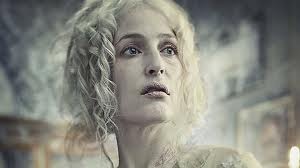
But then, although I don't remember much about the old black and white film, I do carry memories of the equally marvellous Martita Hunt. Not that she wasn't beautiful too in her way but it was closer to the feeling that the book gave me of the decaying and derelict jilted bride. Though how much of that was costume and sets, it's hard to say.
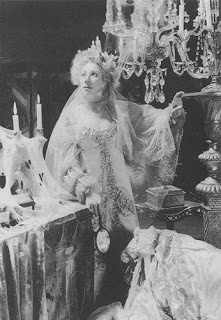 I mean, look at that chandelier! Woman, cake and light fitting are as one. Apart from the actors' looks, I found several things to admire and enjoy in this adaptation and it did well by one of my favourite characters, Joe Gargery. It got me thinking for this post about my favourite Dickens' novels too.
I mean, look at that chandelier! Woman, cake and light fitting are as one. Apart from the actors' looks, I found several things to admire and enjoy in this adaptation and it did well by one of my favourite characters, Joe Gargery. It got me thinking for this post about my favourite Dickens' novels too.One of them is his last, the unfinished Mystery of Edwin Drood and by great good fortune, this was also adapted by TV, in two installments last week.
I have on my shelves a "complete Edwin Drood" with an ending written by the late great Leon Garfield, which I doubt could be surpassed. The Gwyneth Hughes version for TV made so many changes that I feel I really must read the book again to see how much of it was justified by the portion Dickens had written before death prevented his completing it in 1870.
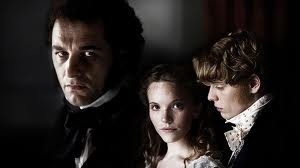
Here, as always, it seems really to be the mystery of John Jasper, played in this version by a suitably brooding Matthew Rhys. But the minor characters of Mr Grewgious (Alun Armstrong), Canon Crisparkle (Rory Kinnear) and his mother (Julia Mackenzie) were all beautifully rounded out.
So, my favourite Dickens novels are:
David Copperfield
Great Expectations
Little Dorrit
Dombey and Son
Our Mutual Friend
Edwin Drood
And my favourite characters:
Joe Gargery
Dick Swiveller (The Old Curiosity Shop)
Betsy Trotwood (David Copperfield)
Mr Twemlow (Our Mutual Friend)
Mr Wemmick (Great Expectations)
Mrs Plornish (Little Dorrit)
Flora Finching (Little Dorrit)
What are your favourite books and characters of Dickens? And what are your favourite film and TV adaptations?
Published on January 14, 2012 21:27
January 10, 2012
Sherlock vs. Holmes
I wasn't a huge fan, though I read them all as a kid. I think the character is better than any of the stories he appears in. You might think this would make me a purist about portrayals of the Great Detective, but I'm not.
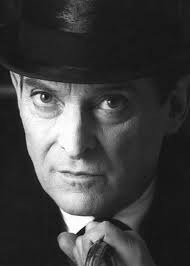
I liked the Jeremy Brett interpretation on the TV (much later I learned that my father-in-law-to-be had been script editor for that series). I liked Robert Stephens in the film The Private Life of Sherlock Holmes. I enjoyed the late Michael Williams on the radio (even though a dog was addressed as "Cerebos" - so you had to take it with a pinch of salt). I am too young for Basil Rathbone
I watched the first Guy Ritchie movie on DVD at a friend's home in Venice and QUITE enjoyed it but couldn't help wondering why you would take a detective best known for his cerebral (Cereboral?) skills and change him into an all-action hero.
But the reinterpretation I've liked best, nay, LOVED, is Benedict Cumberbatch in Stephen Moffat's and Mark Gatiss's television Sherlock.
Yes, the Chinaman episode in Series one was c**p, yes, A Scandal in Belgravia was a bit sex-stereotyped and yes, Moriarty sounds like Graham Norton and looks as frightening as an animated haddock. But it really is fresh as well as funny, smart as well as sexy, and it has the wonderful Una Stubbs turning Mrs Hudson into a real character, in spite of Conan's Doyle's unpromising creation.
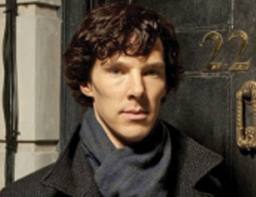
And they're right "brainy is the new sexy." Did you SEE BC in Starter for Ten? The transformation is astounding. You can keep your dishevelled, stubbly, quick-to-punch Robert Downey Jr. (and many of you will want to). He may have his disreputable charm but he just isn't Sherlock Holmes.
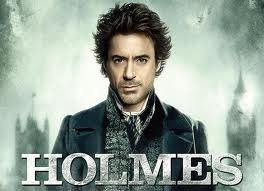
And why set it in period if you think the Savoy would have let in said stubbly, bruised and cut, tie-less diner?
BC on the other hand really is credible as the "high functioning sociopath" a combination of autistic savant and 21st century geek.
I've now seen two episodes and really enjoyed them both, even though they are getting a bit self-referential with all the "cheekbones" stuff and the endless harping on about Holmes and Watson aren't in a gay relationship.
But people I love and respect have not liked them at all.
Where do you stand on the Moffatt/Gatiss vs Ritchie issue? Or Cumberbatch/Downey Jr one? (Or even Freeman/Law if you like)

I liked the Jeremy Brett interpretation on the TV (much later I learned that my father-in-law-to-be had been script editor for that series). I liked Robert Stephens in the film The Private Life of Sherlock Holmes. I enjoyed the late Michael Williams on the radio (even though a dog was addressed as "Cerebos" - so you had to take it with a pinch of salt). I am too young for Basil Rathbone
I watched the first Guy Ritchie movie on DVD at a friend's home in Venice and QUITE enjoyed it but couldn't help wondering why you would take a detective best known for his cerebral (Cereboral?) skills and change him into an all-action hero.
But the reinterpretation I've liked best, nay, LOVED, is Benedict Cumberbatch in Stephen Moffat's and Mark Gatiss's television Sherlock.
Yes, the Chinaman episode in Series one was c**p, yes, A Scandal in Belgravia was a bit sex-stereotyped and yes, Moriarty sounds like Graham Norton and looks as frightening as an animated haddock. But it really is fresh as well as funny, smart as well as sexy, and it has the wonderful Una Stubbs turning Mrs Hudson into a real character, in spite of Conan's Doyle's unpromising creation.

And they're right "brainy is the new sexy." Did you SEE BC in Starter for Ten? The transformation is astounding. You can keep your dishevelled, stubbly, quick-to-punch Robert Downey Jr. (and many of you will want to). He may have his disreputable charm but he just isn't Sherlock Holmes.

And why set it in period if you think the Savoy would have let in said stubbly, bruised and cut, tie-less diner?
BC on the other hand really is credible as the "high functioning sociopath" a combination of autistic savant and 21st century geek.
I've now seen two episodes and really enjoyed them both, even though they are getting a bit self-referential with all the "cheekbones" stuff and the endless harping on about Holmes and Watson aren't in a gay relationship.
But people I love and respect have not liked them at all.
Where do you stand on the Moffatt/Gatiss vs Ritchie issue? Or Cumberbatch/Downey Jr one? (Or even Freeman/Law if you like)
Published on January 10, 2012 01:01
January 3, 2012
Christmas haul
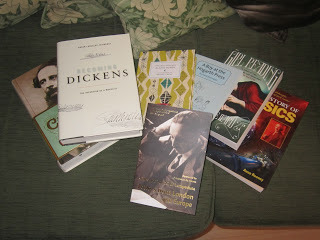 Books do furnish a room, don't they? (Except when they are on a Kindle, but that's another blog post). This was what I got for Christmas (and not all my presents were books, so I am a lucky girl).
Books do furnish a room, don't they? (Except when they are on a Kindle, but that's another blog post). This was what I got for Christmas (and not all my presents were books, so I am a lucky girl).BOTH new biographies of Dickens, which will be appropriately read this bi-centenary year. Two beautifully-produced titles - The Dud Avocado and A Boy at the Hogarth Press (Have to share this one with husband).
Also shared and and my proudest book moment yet, Anne Rooney's The Story of Physics, IN WHICH I GET AN ACKNOWLEDGMENT! Yes, your eyes do not deceive you. An acknowledgment in a Physics book, when I have not had one Physics lesson in my life. Admittedly it was more for general encouragement than science but I glow with pride every time I look at it. And of course I shall read it and then know some Physics.
I also have the letters of Giuseppe Tomasi di Lampedusa, who wrote The Leopard (IL Gattopardo) one of my favourite books and made into a pretty decent film too.
The seventh is Girl Reading, a very clever find by husband, in which the first chapter is about Simone Martini's Annunciation, my favourite painting in the world.
I'll report back as I read them and certainly have already good material for another booky year. But first I must finish reading Bill Bryson's wonderful At Home, about the history of domestic houses, rooms and household management, which immensely more interesting even than it sounds. About to read 34 pages on the fuse box!
Happy New Year to you all and good reading.
Published on January 03, 2012 12:31
December 20, 2011
My year of books and book-matters
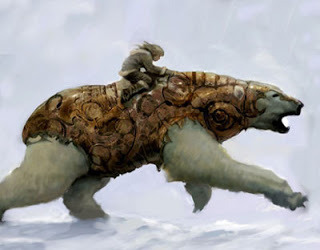 It has been a real year of books for me, written, published, read, reviewed, researched in, awarded prizes and celebrated with other readers. It began in January at Oxford Town Hall, listening to Philip Pullman's impassioned speech in defence of libraries. By February my local library that was the most under threat, Bampton, which is in the village filmed for Downton Abbey (the library is the cottage hospital) had an action group in place and we had a brilliant Save our Libraries day with local celeb, Kirsty Young, Linda Newbery and me reading from loved books.
It has been a real year of books for me, written, published, read, reviewed, researched in, awarded prizes and celebrated with other readers. It began in January at Oxford Town Hall, listening to Philip Pullman's impassioned speech in defence of libraries. By February my local library that was the most under threat, Bampton, which is in the village filmed for Downton Abbey (the library is the cottage hospital) had an action group in place and we had a brilliant Save our Libraries day with local celeb, Kirsty Young, Linda Newbery and me reading from loved books.It was in February that Martin Amis said he would have to be brain-damaged before writing a children's book.
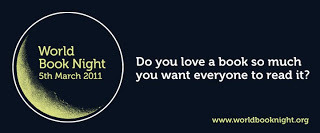
March was the first World Book Night and I stood in Trafalgar Square listening to Mark Haddon, Dvaid Nicholls, Philip Pullman (again!) and the wonderful Lemn Sissay, before giving out my WBN choice - Fingersmith - in Bampton library. Because of a bit of a mix-up I ended up with extra copies of Fingersmith, which meant I could launch my own book group.
We are the Nordic Readers, not because we specialise in Scandinavian crime but because it grew out of the Nordic Walking group I am part of. We've read half a dozen other novels since, our favourite being Kathryn Stockett's The Help and the one we liked least Christian Tsolkas' The Slap.
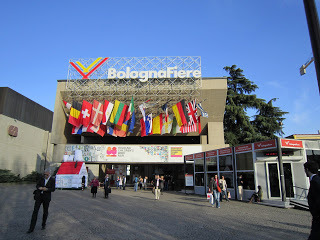
The spring took me back to the Bologna Book Fair as usual and I also made it to the London Book Fair. The two are so very different, but I'm determined to crack how to "do" the London one properly in 2012.
In April, a group of seventeen writers of historical fiction gathered in Michelle Lovric's fabulous Thameside apartment to talk about a mad idea I had. By the beginning of July we launched as The History Girls. We get the most wonderful posts from twenty-eight writers for children, teenagers and adults and in six months we have had nearly 60,000 hits and gained over 200 followers.
Something that had been started rather selfishly by me to promote my novel David, has become a terrific resource in its own right and next year we'll be having guest posts from Kevin Crossley-Holland and Hilary Mantel among others.
So David came out at the beginning of July and I did a Blog Tour with thirty-two stops! All were scheduled in advance but for two of the four weeks plus, I was in different cities in Italy, without WiFi, and had to rely on my daughter Rhiannon Lassiter and my good friend Anne Rooney to make sure they were up on the right day.
Promoting one book while writing another sounds like one of the silly games on British radio's "I'm Sorry I Haven't a Clue." And I certainly don't recommend it, but Stravaganza: City of Swords got handed in on time at the end of July and will be out next year.
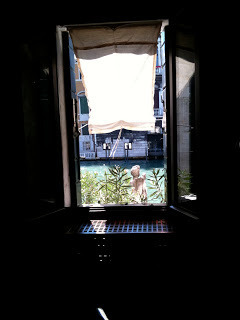
August found me in Venice, at a "Writers' Boot Camp" on the Grand Canal, working on the adult novel I've written and am now restructuring. There's nothing like swapping ideas with two other writers over prosecco and olives on a terrace overlooking that green water and spotting egrets.
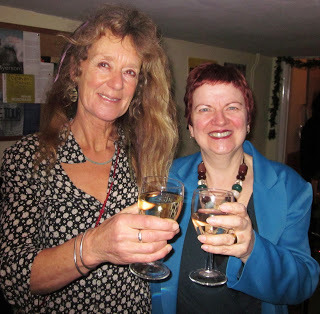 Caroline Binch and the Book Maven
Caroline Binch and the Book MavenIn September Grace at Christmas was published and we had a party to celebrate twenty years of Grace in December.
October was a bit less literary as our middle daughter got married (in Bampton) in a heat wave but November took me to Somerset for another writing retreat, this time with other members of the Scattered Author's Society (SAS). I was able to do almost all my City of Swords edits there. We drank hot chocolate in the woods but failed to see badgers.
I've also joined a literary salon, about which my lips are sealed, but I have goggled at the amount of talent around the dinner table, combined with the warmth and friendliness of the other writers.
My books of the year
I bought a Kindle last year and the first book I read on in this year was Hilary Mantel's Wolf Hall. This would be a book of the year for me whatever format it was read in but this was convenient to hold in bed and on public transport. The others were all read conventionally on dead trees: Barbara Kingsolver's The Lacuna, Edmund de Wahl's The Hare With Amber Eyes and Tea Obrecht's The Tiger's Wife, which won the Orange Prize, most deservedly. (Actually maybe I should have put the Hare on my Kindle since the Faber paperback fell apart as I read it). My non-fiction favourite, which I'd been waiting to get in paperback, was James Shapiro's Contested Will, about who wrote the plays known as by Shakespeare. (He thinks Shakespeare and so do I!)
My Children's Books of the Year
The best picture book was for me Penny Dale's Dinosaur Dig (Nosy Crow), brilliantly combining two elements endlessly interesting to small readers. For juniors A Dog and his Boy by Eve Ibbotson was perfection. For older children, Patrick Ness's A Monster Calls(Walker Books), based on an idea by the late Siobhan Dowd, will win prizes for sure. The most interesting teenage read was Sally Gardner's The Double Shadow (Orion) (I hope my Guardian review of it comes out before Christmas).
Departures
Three great children's writers died this year: Diana Wynne Jones, Eve Ibbotson and - just recently - Russell Hoban. I am a cover-to-cover reader of DWJ, though my favourites are Fire and Hemlock, Howl's Moving Castle and A Tale of Time City. She will be much missed. I haven't read as much Eve Ibbotson as I should but after A Dog and his Boy and The Secret Countess, I know I'll follow up on the others.
My daughters were brought up on Russell Hoban's Frances the badger books and phrases from them have entered family vocabulary. But in his adult novel, Turtle Diary, a writer is haunted by the children's books she has written about an insect and I wonder if he hated being remembered for Frances rather than his many fine adult books.
Arrivals
Sadness at losing these great writers can be tempered by noting that Tea Obrecht is only twenty-six and The Tiger's Wife her first novel. There were four débuts on the Man Booker shortlist too, though a veteran, Julian Barnes, won. New children's writers were Miriam Halahmy, whose Hidden was published by Meadowside, Sita Brahmachari, whose Artichoke Hearts (MacMillan) won the Waterstone's First Book Award and Candy Gourlay, whose Tall Story (David Fickling Books) was truly original.
The Book Maven wishes all readers a happy and bookfilled year in 2012
Published on December 20, 2011 12:04
December 9, 2011
Know Your Reader's Inner Synaesthete by Nicola Morgan
Book Maven is happy to welcome Nicola Morgan today for a guest post on her Blog Tour. Mondays might be red but this makes Friday a Red Letter Day. Thanks, Nicola.
Mondays are Red was Nicola Morgan's debut YA novel, published in 2002. Nicola is now delighted to be producing the ebook, with a new cover and brand new extra material, including creative writing by school pupils inspired by the book. For details about how to buy (price around £2.23) See here
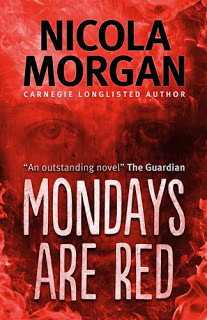
About the book
When Luke wakes from a coma, his world has altered. Synaesthesia confuses his senses and a sinister creature called Dreeg inhabits his mind. Dreeg offers him limitless power – even the power to fly – and the temptations are huge, but the price is high. Who will pay? His mysteriously perfect girlfriend, with hair as long as the sound of honey? His detested sister, Laura, with the wasps in her hair? When Laura goes missing, Luke realizes the terrible truth about himself and his power. His decision is a matter of life and death, and he will have to run faster than fire.
Thank you, Mary, for letting me invade your excellent blog today. I am honoured! You said you'd like me to talk about synaesthesia and because there's so much to say about it, I've paired it with Lucy Coats' blog. So, Part 1 – the facts and how to tell if you have the condition – was there and Part 2 – about what it means for writers – is here.
Synaesthesia, in short, is when two or more of the senses are "crossed over", so that the person experiences colours when hearing sounds, or tastes when feeling shapes, or coloured shapes when smelling something. Days of the week, letters and numbers can have colours, and the sensations are always automatic, not deliberate, and remain identical over time. (More factual stuff on Lucy's blog.)
It's my belief that, although true synaesthesia is rare, the vast majority of people can "do" synaesthesia. We almost all have an inner synaesthete. I also believe that understanding this gives writers an incredibly powerful tool – a much more powerful tool than true synaesthesia, an experience which most people don't share. (A true synaesthete's sensations are effectively random and will sound surreal to the rest of us, whereas the normal reader's synaesthesia is connected with meanings, semantics, emotions, things we all share.)
I think it's about time I explained. Or, more appropriately, showed.
Imagine the sound of a violin, the high, shrill notes. Now tell me which of these three colour groups you think most suit that sound: 1) pale lemon yellows and lime greens, 2) bright reds and orange, 3) dark blues and purples. Around 5% of you will have said 3. 10-15% of you will say 2. And at least 80% of you will say 1. And that's a conservative estimate. How do I know? Because I used to have a game on my website and I collected hundreds of responses to these and similar questions; I also do this when I talk about Mondays are Red at school events, and the proportion of responses vary little.
Here's another question. Think of the low sounds of a cello or bassoon. Which colour group? 95% will say 3. Around 4% will say 2 and almost no one will say 1.
Imagine two fish. One is thin and spiky. The other is round, fat and smooth. One is called a Baroom. The other is called a Kikxis. Which is which? Around 90-95% of people will say that the spiky one is the Kikxis. (Fewer if I'm talking to teenagers because they like to be provocative.) There isn't a correct answer, by the way – the fish are invented.
Why? Well, the fish thing is obvious. The letters – shape and sound – in Kikxis are spiky and sharp; the letters and sounds in Baroom are round and soft. The music-colour thing seems obvious to me, too, but may seem less so to others. But when you think properly about the ways in which we naturally describe sounds, it's not so surprising: a voice, for example, could easily be sharp, thin, thick, rounded, soft, hard, light, heavy, dark, warm, cold, rich, bitter. And many words can be attributed to different sensations. "Sharp" can be taste, shape, or touch, for example. Extend this to describing a voice (as I do in Mondays are Red) as buttery, melting, or tasting of apple-purée and it's not much of a stretching of the imagination.
Part of this – as writers recognise – is because any word comes with a load of secondary attachments. So, apple-purée is more than mashed apple: it is warm and thick and sweet and soft, rolling on the tongue, slipping down the throat. It is not dry or dusty or icy or blue or spiky. In Mondays are Red, the girl with the cinnamon skin has "hair as long as the sound of honey". Well, honey may not have a sound but it is thick and moves slowly and if dropped from a spoon is long and straight and golden and full of goodness. And that is what her hair was like. It's not beyond the bounds of imagination to feel that it could have a sound, too. Violin sounds are lemon-sharp and lemon-yellow and lime-tangy, thin, sharp, bitter, stringy. All these words bring with them more than a single literal meaning.
And that's what we harness when we write. We join our wordsmithery to the shared meanings and emotions and experiences in the mind and heart of our reader. We cross the void between two minds and truly connect. When we recognise the inner synaesthete in ourselves and our reader, and harness it, there's no limit to the power of language. And that, in a nutshell is what Mondays are Red is "about", as Luke discovers the infinite power of language.
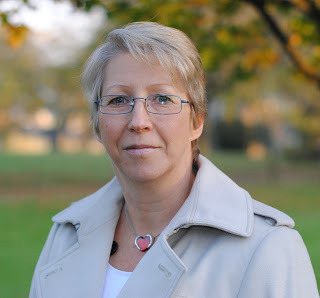
Thank you, Mary, for allowing me to come and sound off on your esteemed blog! I hope your readers will give Mondays are Red a try and see more of what I'm talking about. http://www.nicolamorgan.com/author/books/mondays-are-red
Thank you, Nicola, for stopping by on your tour. Now you can relax on the sofa with a glass iof some seasonal, as this is your last stop!
Mondays are Red was Nicola Morgan's debut YA novel, published in 2002. Nicola is now delighted to be producing the ebook, with a new cover and brand new extra material, including creative writing by school pupils inspired by the book. For details about how to buy (price around £2.23) See here

About the book
When Luke wakes from a coma, his world has altered. Synaesthesia confuses his senses and a sinister creature called Dreeg inhabits his mind. Dreeg offers him limitless power – even the power to fly – and the temptations are huge, but the price is high. Who will pay? His mysteriously perfect girlfriend, with hair as long as the sound of honey? His detested sister, Laura, with the wasps in her hair? When Laura goes missing, Luke realizes the terrible truth about himself and his power. His decision is a matter of life and death, and he will have to run faster than fire.
Thank you, Mary, for letting me invade your excellent blog today. I am honoured! You said you'd like me to talk about synaesthesia and because there's so much to say about it, I've paired it with Lucy Coats' blog. So, Part 1 – the facts and how to tell if you have the condition – was there and Part 2 – about what it means for writers – is here.
Synaesthesia, in short, is when two or more of the senses are "crossed over", so that the person experiences colours when hearing sounds, or tastes when feeling shapes, or coloured shapes when smelling something. Days of the week, letters and numbers can have colours, and the sensations are always automatic, not deliberate, and remain identical over time. (More factual stuff on Lucy's blog.)
It's my belief that, although true synaesthesia is rare, the vast majority of people can "do" synaesthesia. We almost all have an inner synaesthete. I also believe that understanding this gives writers an incredibly powerful tool – a much more powerful tool than true synaesthesia, an experience which most people don't share. (A true synaesthete's sensations are effectively random and will sound surreal to the rest of us, whereas the normal reader's synaesthesia is connected with meanings, semantics, emotions, things we all share.)
I think it's about time I explained. Or, more appropriately, showed.
Imagine the sound of a violin, the high, shrill notes. Now tell me which of these three colour groups you think most suit that sound: 1) pale lemon yellows and lime greens, 2) bright reds and orange, 3) dark blues and purples. Around 5% of you will have said 3. 10-15% of you will say 2. And at least 80% of you will say 1. And that's a conservative estimate. How do I know? Because I used to have a game on my website and I collected hundreds of responses to these and similar questions; I also do this when I talk about Mondays are Red at school events, and the proportion of responses vary little.
Here's another question. Think of the low sounds of a cello or bassoon. Which colour group? 95% will say 3. Around 4% will say 2 and almost no one will say 1.
Imagine two fish. One is thin and spiky. The other is round, fat and smooth. One is called a Baroom. The other is called a Kikxis. Which is which? Around 90-95% of people will say that the spiky one is the Kikxis. (Fewer if I'm talking to teenagers because they like to be provocative.) There isn't a correct answer, by the way – the fish are invented.
Why? Well, the fish thing is obvious. The letters – shape and sound – in Kikxis are spiky and sharp; the letters and sounds in Baroom are round and soft. The music-colour thing seems obvious to me, too, but may seem less so to others. But when you think properly about the ways in which we naturally describe sounds, it's not so surprising: a voice, for example, could easily be sharp, thin, thick, rounded, soft, hard, light, heavy, dark, warm, cold, rich, bitter. And many words can be attributed to different sensations. "Sharp" can be taste, shape, or touch, for example. Extend this to describing a voice (as I do in Mondays are Red) as buttery, melting, or tasting of apple-purée and it's not much of a stretching of the imagination.
Part of this – as writers recognise – is because any word comes with a load of secondary attachments. So, apple-purée is more than mashed apple: it is warm and thick and sweet and soft, rolling on the tongue, slipping down the throat. It is not dry or dusty or icy or blue or spiky. In Mondays are Red, the girl with the cinnamon skin has "hair as long as the sound of honey". Well, honey may not have a sound but it is thick and moves slowly and if dropped from a spoon is long and straight and golden and full of goodness. And that is what her hair was like. It's not beyond the bounds of imagination to feel that it could have a sound, too. Violin sounds are lemon-sharp and lemon-yellow and lime-tangy, thin, sharp, bitter, stringy. All these words bring with them more than a single literal meaning.
And that's what we harness when we write. We join our wordsmithery to the shared meanings and emotions and experiences in the mind and heart of our reader. We cross the void between two minds and truly connect. When we recognise the inner synaesthete in ourselves and our reader, and harness it, there's no limit to the power of language. And that, in a nutshell is what Mondays are Red is "about", as Luke discovers the infinite power of language.

Thank you, Mary, for allowing me to come and sound off on your esteemed blog! I hope your readers will give Mondays are Red a try and see more of what I'm talking about. http://www.nicolamorgan.com/author/books/mondays-are-red
Thank you, Nicola, for stopping by on your tour. Now you can relax on the sofa with a glass iof some seasonal, as this is your last stop!
Published on December 09, 2011 01:01
December 1, 2011
Charles Dickens and me
 Over the years, when I've been asked "Who is your favourite writer?" I have often answered "Charles Dickens." And sometimes added that a lot of people say that without having actually read many of his books, while I have read them all.
Over the years, when I've been asked "Who is your favourite writer?" I have often answered "Charles Dickens." And sometimes added that a lot of people say that without having actually read many of his books, while I have read them all.And that is approximately true; I think I gave up before finishing quite all of the essays on America and Italy but I've read books like Barnaby Rudge and The Old Curiosity Shop and the "big" novels many times. My favourites are Our Mutual Friend, which has now become quite popular, Little Dorrit and Dombey and Son.
But why do I like him enough to read and re-read him? We have had a long relationship, Dickens and I, but one thing I have always liked about him is that his dates are so easy to remember: 1812-70 and I have real trouble with dates, which is a drawback for a History Girl. I know things like the deposition of Richard 11 (1399) and Battle of Bosworth Field (1485) but that's really because of an obsession with Shakespeare (1564-1616) and currently the Plantagenets.
If you ask me even Jane Austen or J.S.Bach, I have to look them up - or ask my husband which is quicker because he has real penny-in-the-slot recall for facts of that kind.
Anyway, born 1812 means a big anniversary next year and the biographies are already coming out, with Claire Tomalin's having been shortlisted for the Costa Book Award. It is being read on radio 4 currently and a fact I learned this morning interested me very much. Apparently Dostoevsky said that Dickens told him (imagine - Dickens and Dostoevsky having a chat!) that all his villains came from his own inner demons and all his "good" characters from the way he tried to live his life.
So Quilp, Mr Squeers, Bill Sykes, Mr Murdstone - what a wealth of villains there are! - were all aspects of Dickens' own personality. And why not? If Freud reckoned every person and thing in a dream is an aspect of the dreamer, that works just as well for writers who dream on to the page all day long.
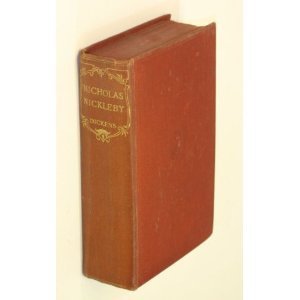 When I was a child, my parents had a complete set of Dickens' novels bought through the Daily Express I think. They had a red binding and as soon as I was old enough I devoured them. When I left home I bought a similar set from a secondhand book shop. I have the Oxford complete set now, a present from the encyclopaedic husband, and the cheap ones are up in the attic but still on shelves, not hidden away in boxes.
When I was a child, my parents had a complete set of Dickens' novels bought through the Daily Express I think. They had a red binding and as soon as I was old enough I devoured them. When I left home I bought a similar set from a secondhand book shop. I have the Oxford complete set now, a present from the encyclopaedic husband, and the cheap ones are up in the attic but still on shelves, not hidden away in boxes.They have been companions and friends, read while ill in bed, on long train journeys, on evenings without a TV, when I lived in London and the man I was to marry lived in Cambridge one long year.
And the reason? Because Dickens is such a generous writer, so prolific in his ideas, so prodigal with his plots and characters. I have always believed that he could have written a full-length novel about any one of his minor characters. And the physical descriptions are so memorable: Mr Vholes scratching with black-gloved hands at his pimples, Lady Tippins with her face like a reflection in a spoon, Mr Twemlow from the same novel, who is like an extra leaf in a dining table, inserted on certain occasions to make the dinner go more smoothly.
My late father-in-law disliked Dickens intensely and thought him a bad writer - "so crude." He preferred Flaubert. His privilege, but I think what he saw as crudeness, expressed after reading Hard Times, is what I think of as the energy and vigour. No, the prose is not refined, but the sheer inventiveness is a gift made freely to the reader.
So many favourite characters: Dick Swiveller, Betsy Trotwood, Flora Finching, Peggotty, Mr Jingle - every book yields up a gem or two. There are maddening ones too, like Dora Spenlow and Tiny Tim and Little Nell, where the popular taste for sentimentality knocks Dickens temporarily from his splendidly keen observational perch.
There is also always a murder or violent death somewhere in all those hundreds of thousands of words. And those are the passages Dickens loved to read aloud at the personal performances which might have shortened his life, so physically exhausting were they. It reminds us of what he said to Dostoevsky; he had a strong sense of the potential for evil in himself, in every one of us, as I do.
In the unfinished Mystery of Edwin Drood, a foul murder is suspected and the main suspect is John Jasper. The late great Leon Garfield wrote a splendid completion of the book - utterly convincing - which I keep beside the collected novels. If that wasn't how Dickens was going to end it, it should have been: the convicted man waiting in his cell for the 8 o clock of his last morning on earth, knowing that there will be no reprieve and no spangly Christmas fairy coming down with a wand to make all things well.
I think we don't need another biography to tell us that Dickens did not live up to his aim of living "like his good characters" - though I shall certainly read Claire Tomalin's. But it is never a good idea to let the life dictate how the reader feels about the writer, or the composer or painter, come to that.
The Complete Works of Charles Dickens was one of my first purchases on my Kindle, along with Shakespeare and Jane Austen. With so many ways to read him, in and out of the house, there will be no excuse not to make 2012 the year of the Big Re-read. I can't wait!
Published on December 01, 2011 22:03
November 3, 2011
Who owns morality?
[image error]
By the time you read this, it will have been announced that The Great Big Book of Families has won the Under-7 category of the School Library Association's inaugural Information Book Awards.
This is naturally a great honour; writers and illustrators love winning prizes. But I have two special reasons for being pleased about this one. Firstly, it comes from an organisation close to my heart. For six years I ran a campaign to support and promote School Library Services in the UK. So I am very happy that an award given by the SLA has gone to my work.
Secondly this book sums up a lot of what I think about children and books. I had wanted to write something like this for a long time, ever since a girl of twelve wrote me a letter thanking me for helping her learn to read and mentioning that her family consisted of her "my mum and my budgie."
I have felt for ages that children's picture books lag far behind children's reality in depicting the wide range of what constitutes a definition of "family". And reflecting children's own experience is one of the two most important things a book can do (the other of course being to introduce them to ideas way beyond their experience).
I'd done what I could in the past with books about Grace, who lives in a family of three generations of women, with an absent father, and in stories like My Grandma has Black Hair, Nancy No-size and The Colour of Home, in trying to widen the portrayal of families in picture books. But I wanted to tackle the big idea that "families come in all shapes and sizes" in one book. And I wanted to do it with Ros Asquith.
I honestly believe that if Ros hadn't been taken with the idea, The Great Big Book of Families, would not have been written and published; I certainly told my editor at Frances Lincoln, Janetta Otter-Barry, that if Ros said no, I might not write it.
So I was thrilled when Ros did like the idea and wanted to illustrate it. From the small acquaintance I'd had with her before and my knowledge of her cartoons, I just knew she would understand "where I was coming from" politically with this book and would not need elaborate explanations. Over a couple of lunches in Gloucestershire and North London, we talked about exactly what the book was about and for and then I took the plunge with a draft text.
It changed of course when Ros's glorious pictures came in. And we worked on it as a very committed quartet: me. Ros, Janetta and the Art Director, Judith Escreet. It was published in the UK in April 2010 and in the US in 2011. Pleasingly, it has already picked up foreign editions in double figures but we always knew that there would be an issue in some countries with one spread.
On the second opening, headed up just "Families" I wrote, among other text, "Some children have two mummies or two daddies." Ros illustrated this statement appropriately. This seems to me to be incontrovertible fact, at least as far as the western world is concerned. The book has had three starred reviews in the US, which is where you might have expected a book containing this statement to be not so well received.
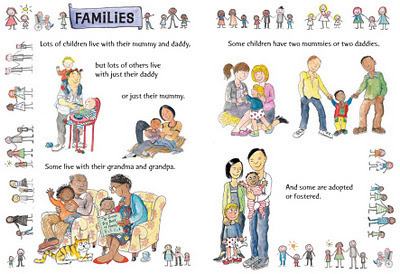
But I had to turn down an edition in an Arab country which would have involved removing those words and those pictures. My publisher was very understanding, even though no publisher likes to give up a foreign rights deal.
In the last couple of weeks, I have seen two conflicting reactions to the book. The first was a review on amazon.com, which Ros emailed to me (I make it an iron rule never to look at Amazon reviews or rankings so had missed it).
This one-star review was headed up "Lacks morality" and included the words: "For those who think "this looks like a cute book", think again. I checked this book out at the library and actually had to have a discussion with my kids about why we don't marry people of the same gender. As a Christian with high moral standards I don't have to teach my kids that such things are acceptable. It is not acceptable to God and it is not acceptable to me. I hate it when people are so concerned with "political correctness" that they worry more about offending people than offending God."
I have learned over the years to mistrust the term "political correctness," even though it refers to something I have been thinking about for around four decades. I prefer words like "inclusiveness" and "diversity" because in my experience, PC is only ever used by people who are against those things. Take the reviewer above. S/he says my book "lacks morality" when s/he means "does not share my morality." And "we don't marry people of the same gender" when clearly we do. At least we do in nations from Argentina to South Africa, as well as in 20 European countries and 13 American States.
S/he also has a hotline to the Almighty about whether such unions are "acceptable." Something, I as a professed though uncertain Christian do not share.
I was not upset by the review - the less so as a few days before I had received an email through my website from a teacher in the US who said, " Sadly, there are many parents in my school community that do not believe their students should be learning about people in the LGBT community....It's people like you who make families with "two moms" the norm, that keep me going." I think my correspondent meant "normal" rather than "the norm" but I really appreciated the email.
There will always be people who don't understand what I am getting at or do understand it and don't like or approve of it. Every time writers publish a new book, they are putting their heads on the block. It would make for a quieter and easier life just to stay schtum.
That doesn't appear to be an option for me. So it is especially pleasing to have a book that means so much to me acknowledged with a prize. Thank you SLA!
This is naturally a great honour; writers and illustrators love winning prizes. But I have two special reasons for being pleased about this one. Firstly, it comes from an organisation close to my heart. For six years I ran a campaign to support and promote School Library Services in the UK. So I am very happy that an award given by the SLA has gone to my work.
Secondly this book sums up a lot of what I think about children and books. I had wanted to write something like this for a long time, ever since a girl of twelve wrote me a letter thanking me for helping her learn to read and mentioning that her family consisted of her "my mum and my budgie."
I have felt for ages that children's picture books lag far behind children's reality in depicting the wide range of what constitutes a definition of "family". And reflecting children's own experience is one of the two most important things a book can do (the other of course being to introduce them to ideas way beyond their experience).
I'd done what I could in the past with books about Grace, who lives in a family of three generations of women, with an absent father, and in stories like My Grandma has Black Hair, Nancy No-size and The Colour of Home, in trying to widen the portrayal of families in picture books. But I wanted to tackle the big idea that "families come in all shapes and sizes" in one book. And I wanted to do it with Ros Asquith.
I honestly believe that if Ros hadn't been taken with the idea, The Great Big Book of Families, would not have been written and published; I certainly told my editor at Frances Lincoln, Janetta Otter-Barry, that if Ros said no, I might not write it.
So I was thrilled when Ros did like the idea and wanted to illustrate it. From the small acquaintance I'd had with her before and my knowledge of her cartoons, I just knew she would understand "where I was coming from" politically with this book and would not need elaborate explanations. Over a couple of lunches in Gloucestershire and North London, we talked about exactly what the book was about and for and then I took the plunge with a draft text.
It changed of course when Ros's glorious pictures came in. And we worked on it as a very committed quartet: me. Ros, Janetta and the Art Director, Judith Escreet. It was published in the UK in April 2010 and in the US in 2011. Pleasingly, it has already picked up foreign editions in double figures but we always knew that there would be an issue in some countries with one spread.
On the second opening, headed up just "Families" I wrote, among other text, "Some children have two mummies or two daddies." Ros illustrated this statement appropriately. This seems to me to be incontrovertible fact, at least as far as the western world is concerned. The book has had three starred reviews in the US, which is where you might have expected a book containing this statement to be not so well received.

But I had to turn down an edition in an Arab country which would have involved removing those words and those pictures. My publisher was very understanding, even though no publisher likes to give up a foreign rights deal.
In the last couple of weeks, I have seen two conflicting reactions to the book. The first was a review on amazon.com, which Ros emailed to me (I make it an iron rule never to look at Amazon reviews or rankings so had missed it).
This one-star review was headed up "Lacks morality" and included the words: "For those who think "this looks like a cute book", think again. I checked this book out at the library and actually had to have a discussion with my kids about why we don't marry people of the same gender. As a Christian with high moral standards I don't have to teach my kids that such things are acceptable. It is not acceptable to God and it is not acceptable to me. I hate it when people are so concerned with "political correctness" that they worry more about offending people than offending God."
I have learned over the years to mistrust the term "political correctness," even though it refers to something I have been thinking about for around four decades. I prefer words like "inclusiveness" and "diversity" because in my experience, PC is only ever used by people who are against those things. Take the reviewer above. S/he says my book "lacks morality" when s/he means "does not share my morality." And "we don't marry people of the same gender" when clearly we do. At least we do in nations from Argentina to South Africa, as well as in 20 European countries and 13 American States.
S/he also has a hotline to the Almighty about whether such unions are "acceptable." Something, I as a professed though uncertain Christian do not share.
I was not upset by the review - the less so as a few days before I had received an email through my website from a teacher in the US who said, " Sadly, there are many parents in my school community that do not believe their students should be learning about people in the LGBT community....It's people like you who make families with "two moms" the norm, that keep me going." I think my correspondent meant "normal" rather than "the norm" but I really appreciated the email.
There will always be people who don't understand what I am getting at or do understand it and don't like or approve of it. Every time writers publish a new book, they are putting their heads on the block. It would make for a quieter and easier life just to stay schtum.
That doesn't appear to be an option for me. So it is especially pleasing to have a book that means so much to me acknowledged with a prize. Thank you SLA!
Published on November 03, 2011 01:01
October 18, 2011
Writing up and down with A.S.Byatt
Last weekend I appeared at the Cheltenham Festival, talking about David on a panel with H.M.Castor (Vlll) and Pauline Francis (Traitor's Kiss), very ably chaired by Nicolette Jones. It's the third time I've "done Cheltenham" which is only down the road from me and I always enjoy it. The sun always seems to shine, the Green Room is the BEST (beating even Edinburgh's Yurt) and the other events are always interesting.
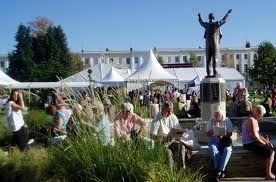
And this time my book was actually set in the same century as the other two writers' - namely the 16th.
[image error] After our session, I went to hear A.S.Byatt talk about her latest book, Ragnarok, which is in the Canongate Myths series. I've always loved the Norse myths best of all - Balder the Beautiful was the first story I can ever remember being told - so I was specially interested in how she might have treated it.
Wagner's Gotterdammerung, which I was pleased she didn't dismiss, is sometimes translated as Twilight of the Gods but can mean Death of the Gods.
What Antonia Byatt wanted was a really bleak ending in which the black waters cover the earth. She was being interviewed by Libby Purves, who is a bit too perky for this subject. But then I remembered they had both lost a son, so maybe she had some empathy with her subject.
What struck me very forcibly was that Byatt said she would not any longer be able to write novels about characters who were much younger than her. I think that's a shame. But I understand what she means, though in her case it's about the technology as much as the moods and emotions.
[image error]
So I hope she will reconsider. There is a character in Ragnarok called The Thin Child in Wartime and Byatt could write about her because she is really the author herself. The child who was moved out into the countryside from Sheffield in the war.
She would finish her work ahead of time in the small rural school she attended and then be allowed to browse in the book collection, which was where she discovered the Norse myths.
About ten years after her I was doing the same in my Secondary School Library, while bunking off games. Balder was speaking to both of us and the bleak beauty of the downfall of the gods.

And this time my book was actually set in the same century as the other two writers' - namely the 16th.
[image error] After our session, I went to hear A.S.Byatt talk about her latest book, Ragnarok, which is in the Canongate Myths series. I've always loved the Norse myths best of all - Balder the Beautiful was the first story I can ever remember being told - so I was specially interested in how she might have treated it.
Wagner's Gotterdammerung, which I was pleased she didn't dismiss, is sometimes translated as Twilight of the Gods but can mean Death of the Gods.
What Antonia Byatt wanted was a really bleak ending in which the black waters cover the earth. She was being interviewed by Libby Purves, who is a bit too perky for this subject. But then I remembered they had both lost a son, so maybe she had some empathy with her subject.
What struck me very forcibly was that Byatt said she would not any longer be able to write novels about characters who were much younger than her. I think that's a shame. But I understand what she means, though in her case it's about the technology as much as the moods and emotions.
[image error]
So I hope she will reconsider. There is a character in Ragnarok called The Thin Child in Wartime and Byatt could write about her because she is really the author herself. The child who was moved out into the countryside from Sheffield in the war.
She would finish her work ahead of time in the small rural school she attended and then be allowed to browse in the book collection, which was where she discovered the Norse myths.
About ten years after her I was doing the same in my Secondary School Library, while bunking off games. Balder was speaking to both of us and the bleak beauty of the downfall of the gods.
Published on October 18, 2011 14:20
October 10, 2011
What do do if you win the Lottery
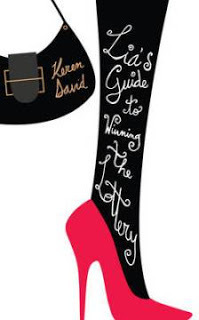 If you should ever be so ?lucky as to win millions of pounds, you might wish you had read this latest book by Keren David. Her heroine Lia finds herself the surprised owner of £8m after her best male friend buys her a lottery ticket for a birthday present.
If you should ever be so ?lucky as to win millions of pounds, you might wish you had read this latest book by Keren David. Her heroine Lia finds herself the surprised owner of £8m after her best male friend buys her a lottery ticket for a birthday present.David has already made a mark on the children's book world with When I was Joe and its sequel, Almost True. It must have been a relief after those novels featuring knife crime, witness protection and life on the run, to turn to champagne, designer handbags and luxury hotels.
But although there are a younger sister with longings to go on Britain's Got Talent, love interest in a mystery boys and some delicious side swipes at the fashion for Paranormal Romance for teens, this is not a frivolous book.
Lia is flung up against some quite hard problems straightaway. What is the morality about keeping all the money? Should she give half to Jack, who bought the ticket? Buy a flat and go and live on her own or help out her struggling baker father and buy her family a new house? Should she stay on at school and take her exams? Lia is only sixteen and doesn't have all the answers.
At first, she doesn't come across as very likeable; in fact when we meet her, she is being thrown out of the house by her mother for being rude and obnoxious. And she does seem to me rather young for her age; more like a fourteen-year-old. But you have to be sixteen to play the lottery and that's the donnée of the book.
Later on it's important that she is sixteen for another reason.
 Perhaps we all dream of winning large sums of money? I know I do (though it's offset in my case by only once ever having bought a lottery ticket!) It's difficult enough to be sure we'd use it wisely even if we are quite grown-up and sensible. For a sixteen-year-old the whole story is full of pitfalls.
Perhaps we all dream of winning large sums of money? I know I do (though it's offset in my case by only once ever having bought a lottery ticket!) It's difficult enough to be sure we'd use it wisely even if we are quite grown-up and sensible. For a sixteen-year-old the whole story is full of pitfalls.All sorts of people come out of the woodwork claiming to be friends (= worthy to be bought expensive presents) while Lia's two real best friends both have problems with accepting anything from her. Jack wants a motorbike but his mother is terrified he'll have an accident when he gets it. And Shazia is made to return a few gifts because her father disapproves of the gambling represented by the lottery. Actually so does Shazia, when she comes to think of it, because she is a devout and serious girl.
All of which gives Lia food for thought. And then her little sister seems to be in danger.
It's an exciting read with plenty of surprises along the way. But a one-off, I think. I believe David will be returning to gritty adventure with her next book, a third title about Ty, the protagonist of the first two books.
Ah well, you only win the lottery once I suppose.
Published on October 10, 2011 11:37
October 6, 2011
Who owns the virtual teaset?
A few months ago, I started a book group with some friends. Yesterday we met to discuss the fourth and far and away the most popular title so far: Kathryn Stockett's The Help. In fact, so much did we like it that we've made a date for us all to go and see the film together next month.
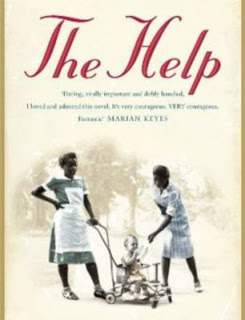
For anyone who has been living at the bottom of a hole for the last two years, The Help is a first novel by White American Kathryn Stockett, who was brought up in the South, largely by Black maids. It is set in the early '60s and features one brave young White woman who has lost contact with her Black maid in mysterious circumstances, which no-one will explain to her.
Skeeter wants to be a writer and has a slender contact with a publisher in New York City; all she has to do is come up with a commercial idea. Gradually a project grows of getting the Black maids in Skeeter's community to talk about their lives. The "book within a book," called just Help, has to be published anonymously, or the maids would certainly lose their jobs. But the truth begins to leak out.
It's a wonderful book, told in the first person by several voices, prime among them Aibileen Clark. It was an instant hit on both sides of the Atlantic and very popular in book clubs. Then one Ablene [sic] Cooper, who is the maid to Stockett's brother's family, took out a lawsuit against the author, claiming she had stolen her name and appearance. You can read the Controversy about The Help.
But the case was dismissed in August because of the statute of limitations. Cooper was very upset, calling Stockett a liar and saying "she knows she did it."
This is reminiscent of the Bookseller of Kabul controversy although that book was presented as non-fiction by author Asne Seierstad.
What is so awful about this case is that the character in the novel, Skeeter, knows she has no book without the testimony of the maids and pays them an exact equal share of the advance she gets and any future royalties. Ablene Cooper must have brought her $75,000 compensation case at least partly because no such arrangement was made with her. (I assume).
It leaves a bad taste even though I still love the book.
 So what has this to do with tea sets? It got me thinking about who owns the events in someone life. Margaret Drabble and her sister A.S.Byatt famously have not got on very well for many decades although there has been a certain civilised rapprochement in recent years, with Drabble attending Byatt's 70th birthday celebrations.
So what has this to do with tea sets? It got me thinking about who owns the events in someone life. Margaret Drabble and her sister A.S.Byatt famously have not got on very well for many decades although there has been a certain civilised rapprochement in recent years, with Drabble attending Byatt's 70th birthday celebrations.
But something that seems to have fuelled their mutual animosity was An argument about a tea set
I have another writer in my family, my daughter, Rhiannon Lassiter We are both as parasitical and predatory for stories as any professional novelist but we have a gentlepersons' agreement to check with one another about who uses what.
Many is the time she has told me a story about someone and I've said, vulture-like, "Can I have that or are you going to use it?" The answer is usually no but that's fine.
But should I be asking the person who experienced the event, owned the tea set, as it were? Neither Drabble nor Byatt owned the real set; it belonged to their mother. But she didn't write about it. Both sisters owned the memory of it, different memories, as were those of their mother. So who had the right to write about either?
In my view, anyone who can! As it happens both of these women are expert novelists and writers of non-fiction and their contrasting viewpoints would be of interest to their readers. In the novel, The Help, it is obviously that the maids would never have dreamed of writing their stories, had no publishing contacts and there would have been no Help without Skeeter. And yet she was scrupulous about dividing her profits with them.
Does it matter that the fictional Skeeter was writing reportage and the real Stockett was writing fiction? These are murky waters.
I have one writer friend who suggested once we should have a writers' exchange of family stories so that those who used them in novels would not be identifiable as sources by said families. We haven't done it but it's an interesting idea.
And I have a hunch that Cooper will get her own book deal and that the product will sell. I'd be interested to read it. But will it prove who owned her story? We shall see.

For anyone who has been living at the bottom of a hole for the last two years, The Help is a first novel by White American Kathryn Stockett, who was brought up in the South, largely by Black maids. It is set in the early '60s and features one brave young White woman who has lost contact with her Black maid in mysterious circumstances, which no-one will explain to her.
Skeeter wants to be a writer and has a slender contact with a publisher in New York City; all she has to do is come up with a commercial idea. Gradually a project grows of getting the Black maids in Skeeter's community to talk about their lives. The "book within a book," called just Help, has to be published anonymously, or the maids would certainly lose their jobs. But the truth begins to leak out.
It's a wonderful book, told in the first person by several voices, prime among them Aibileen Clark. It was an instant hit on both sides of the Atlantic and very popular in book clubs. Then one Ablene [sic] Cooper, who is the maid to Stockett's brother's family, took out a lawsuit against the author, claiming she had stolen her name and appearance. You can read the Controversy about The Help.
But the case was dismissed in August because of the statute of limitations. Cooper was very upset, calling Stockett a liar and saying "she knows she did it."
This is reminiscent of the Bookseller of Kabul controversy although that book was presented as non-fiction by author Asne Seierstad.
What is so awful about this case is that the character in the novel, Skeeter, knows she has no book without the testimony of the maids and pays them an exact equal share of the advance she gets and any future royalties. Ablene Cooper must have brought her $75,000 compensation case at least partly because no such arrangement was made with her. (I assume).
It leaves a bad taste even though I still love the book.
 So what has this to do with tea sets? It got me thinking about who owns the events in someone life. Margaret Drabble and her sister A.S.Byatt famously have not got on very well for many decades although there has been a certain civilised rapprochement in recent years, with Drabble attending Byatt's 70th birthday celebrations.
So what has this to do with tea sets? It got me thinking about who owns the events in someone life. Margaret Drabble and her sister A.S.Byatt famously have not got on very well for many decades although there has been a certain civilised rapprochement in recent years, with Drabble attending Byatt's 70th birthday celebrations.But something that seems to have fuelled their mutual animosity was An argument about a tea set
I have another writer in my family, my daughter, Rhiannon Lassiter We are both as parasitical and predatory for stories as any professional novelist but we have a gentlepersons' agreement to check with one another about who uses what.
Many is the time she has told me a story about someone and I've said, vulture-like, "Can I have that or are you going to use it?" The answer is usually no but that's fine.
But should I be asking the person who experienced the event, owned the tea set, as it were? Neither Drabble nor Byatt owned the real set; it belonged to their mother. But she didn't write about it. Both sisters owned the memory of it, different memories, as were those of their mother. So who had the right to write about either?
In my view, anyone who can! As it happens both of these women are expert novelists and writers of non-fiction and their contrasting viewpoints would be of interest to their readers. In the novel, The Help, it is obviously that the maids would never have dreamed of writing their stories, had no publishing contacts and there would have been no Help without Skeeter. And yet she was scrupulous about dividing her profits with them.
Does it matter that the fictional Skeeter was writing reportage and the real Stockett was writing fiction? These are murky waters.
I have one writer friend who suggested once we should have a writers' exchange of family stories so that those who used them in novels would not be identifiable as sources by said families. We haven't done it but it's an interesting idea.
And I have a hunch that Cooper will get her own book deal and that the product will sell. I'd be interested to read it. But will it prove who owned her story? We shall see.
Published on October 06, 2011 04:59
Mary Hoffman's Blog
- Mary Hoffman's profile
- 591 followers
Mary Hoffman isn't a Goodreads Author
(yet),
but they
do have a blog,
so here are some recent posts imported from
their feed.



